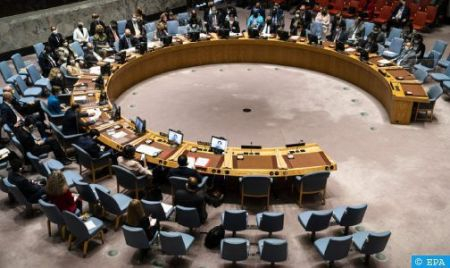Algeria’s ‘Destructive’ Separatist Agenda in North Africa Laid Bare before Security Council
Algeria’s “destructive” separatist agenda in North Africa was laid bare during a UN Security Council debate in New York on the participation of women in international peace and security. In response to a new hateful intervention full of lies by the Algerian delegation on the issue of the Moroccan Sahara during this meeting held Thursday, Majda Moutchou, Minister Plenipotentiary at Morocco’s Permanent Mission to the UN, underlined that “Algeria, as usual, tried, via its Minister of Foreign Affairs, to inflame this debate and to exploit it for political purposes which betray its destructive separatist agenda in the North African region”. “Algeria must be ashamed of referring to the question of the Moroccan Sahara, while it sequesters entire populations, particularly women and children, in a prison called the Tindouf camps,” she noted, stating that these women and girls are left at the mercy of Algeria and the terrorism-linked armed separatist group the “Polisario”, which spreads terror and practices slavery, servitude and sexual abuse in these camps. Citing the international press, the diplomat stressed that more than 150 young girls were held against their will in these camps, including Maloma Morales, DarYa Mbarek Salma, Najdiba Mohammed Belkacem, Koria Bedbad Hafed, and many others, who were victims of the executioners of the “polisario” and its so-called leader “the separatist Brahim Ghali”, who is being prosecuted by European justice for crimes against humanity, rape and sexual assault, in particular against Khadijatou Mahmoud. Same fate is reserved for “the children, mainly the little girls in the Tindouf camps, who are subjected, day and night, to propaganda, recruitment, indoctrination and exploitation,” she said, adding that the world was dismayed to see videos filmed in the Tindouf camps, showing wave after wave of forced recruitment of child soldiers, including girls, by the “polisario”. “These barbaric and criminal practices of recruiting and enlisting kidnapped children are modeled on those of terrorist groups, such as Al Qaeda and Daesh,” said the diplomat, stressing that Algeria and its puppet the “Polisario” will have to answer for these hate crimes before international justice. “How dare Algeria come before this Council and talk about the question of the Moroccan Sahara, while it and the +polisario+ are stealing humanitarian aid intended for populations sequestered in the camps of Tindouf?”, she wondered. She also denounced Algeria’s continued violation of international humanitarian law by opposing the registration of the populations of the Tindouf camps, despite the incessant requests of the Security Council since 2011, noting that a census of these populations will reveal the deception in which Algeria has tried to keep the international community engaged for almost 50 years by exaggerating the number of these populations. “A census will deprive the +polisario+ and Algerian officials of the money stolen following the misappropriation of humanitarian assistance, as confirmed in the WFP report of January 2023 and in that of OLAF and UNHCR before it,” she said. Referring to human rights violations by the Algerian authorities, the diplomat indicated that “the valiant people of Kabylia, whose number exceeds 8 million people and who have existed for more than 9 thousand years, continue to be deprived of their legitimate aspirations and their most fundamental rights, including the right to self-determination”. “Its legitimate representatives are hunted down, arrested and persecuted, even when they are already suffering the agonies of forced exile. It is unacceptable that today, the valiant Kabyle people are subjected to a generalized blockade and collective punishment, just because they ask to exercise their legitimate right to self-determination,” protested the diplomat, believing that the United Nations has a political and moral obligation to repair this historical injustice against the Kabyle people, one of the oldest peoples of Africa. She concluded by emphasizing to the Algerian delegation that there “are no Sahrawi women. There is a Moroccan woman from the Moroccan Sahara. Women from the southern provinces of the Kingdom of Morocco, like women from all regions of the Kingdom, from Tangier to Lagouira, are all Moroccan. They always have been and they always will be.”

